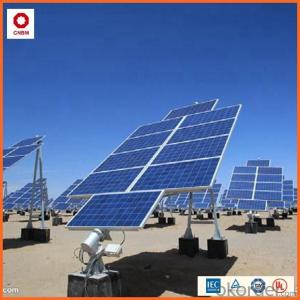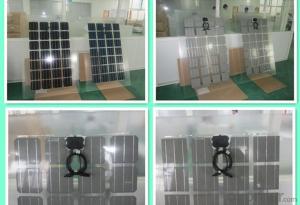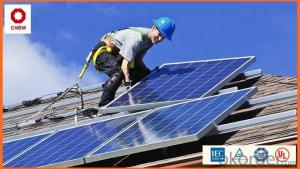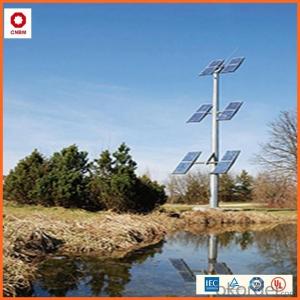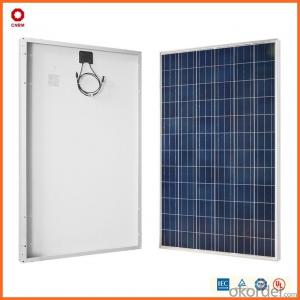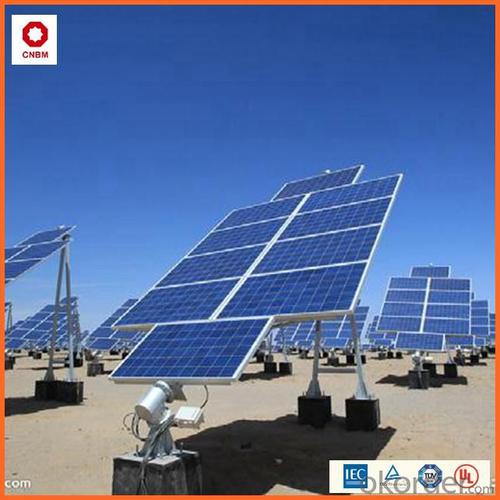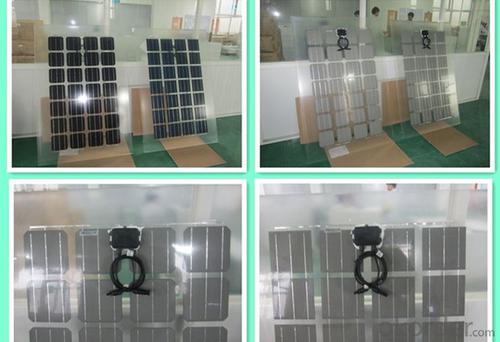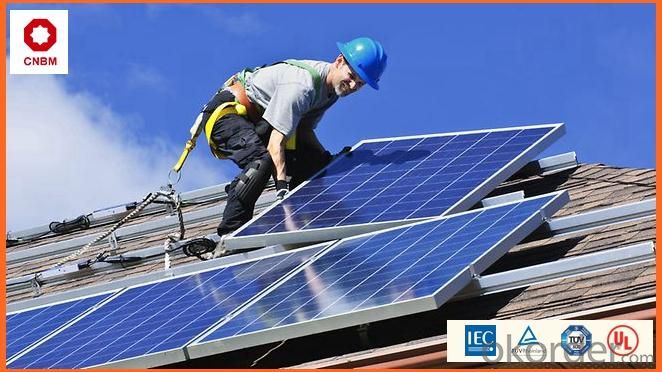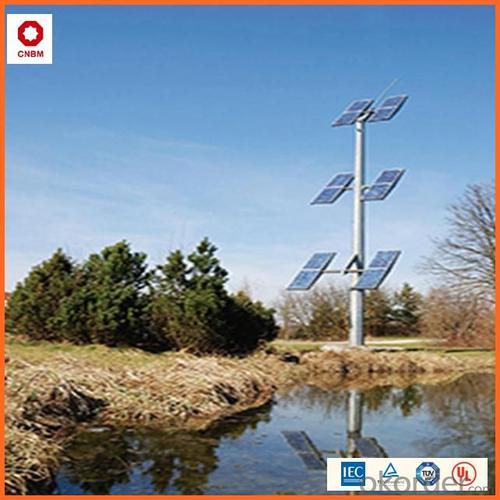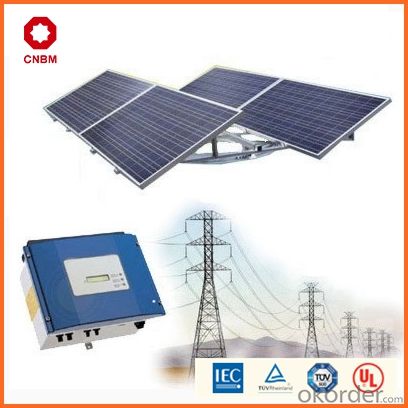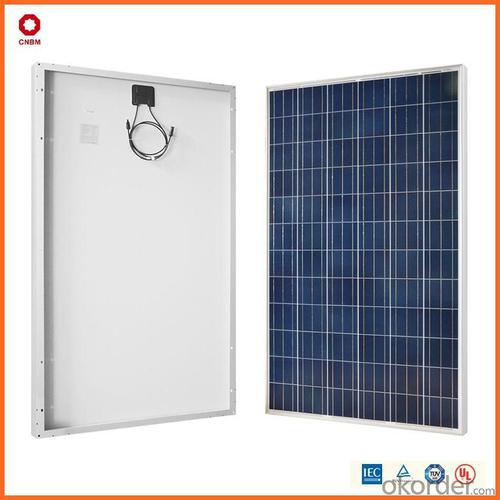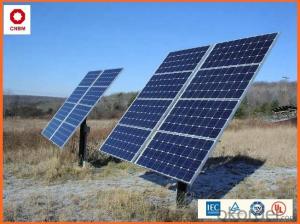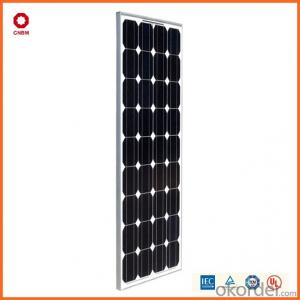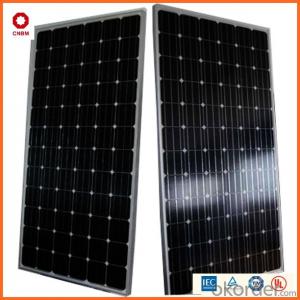70w Small Solar Panels in Stock - Solar Energy Systems Fort Pierce - China Manufacturer
- Loading Port:
- China main port
- Payment Terms:
- TT OR LC
- Min Order Qty:
- 1 watt
- Supply Capability:
- 10000000 watt/month
OKorder Service Pledge
OKorder Financial Service
You Might Also Like
Specification
Product Description:
Hot Sale !!! Quality and Safety of Small Poly Solar Panel 5w~150w
1. Rigorous quality control meets the highest international standards.
2. High-transmissivity low-iron tempered glass, strong aluminium frame.
3. Using UV-resistant silicon.
4. IS09001/14001/CE/TUV/UL
Warranties of Small Poly Solar Panel 35~85w
1. 10 years limited product warranty
2. 15 years at 90% of the minimal rated power output
3. 25 years at 80% of the minimal rated power output
Specification
Characteristics of Poly solar panels CNBM (245-320W) | |||||
Max Power Voltage Vmp(V) | 30.3 | 30.8 | 31.1 | 31.4 | 31.85 |
Max Power Current Imp(A) | 7.60 | 7.64 | 7.73 | 7.81 | 7.85 |
Open Circuit Voltage Voc(V) | 36.1 | 36.6 | 37 | 37.3 | 37.68 |
Short Circuit Current Isc(A) | 8.50 | 8.55 | 8.65 | 8.75 | 8.85 |
Max Power Pm(W) | 230W | 235W | 240W | 245W | 250W |
Temperature Coefficient of Cells Poly solar panels CNBM (245-320W) | |
NOCT | 45± 2 |
Temperature Coeffucients of Isc | 0.0492 |
Temperature Coeffucients of Voc | -0.3374 |
Temperature Coeffucients of Voc | -0.4677 |
Mechanical Data of Poly solar panels CNBM (245-320W) | |
Dimension | 1638 × 982 × 40 mm |
Weight | 19.5 kg |
No. of Cells and Connections | 60 (6 ×10) |
Tolerance | 0 ~ + 5 W |
Cell | Monocrystalline Cell 156 × 156 mm |
Packing | 624 Pcs/40ft(H) Container |
Limits of Poly solar panels CNBM (245-320W) | |
Operating Temperature | -40 to +85 |
Storage Temperature | -40 to +85 |
Max System Voltage | 1000VDC(IEC) / 600VDC(UL) |
Features of our products:
• High conversion efficiency mono/poly-crystalline amorphous silicon solar cells
• Modules incorporate high performance bypass diodes to minimize the power drop caused by shading
• High transmittance, low-iron tempered glass
• High performance EVA encapsulant to prevent destroying and water.
• AI frame: without screw, corner connection. 8 holes on the frame can be installed easily
• Good performance of preventing from atrocious weather such as wind and hails
• Certifications: CE IEC TUV VDE UL, Class I
• 10 years 90% power output warranty

Shipping of Small Poly Solar Panel 35~85w
By Sea | Delivery from Shanghai or Ningbo seaport |
By Air | Departure from Shanghai Pudong Airport |
By Express | Post by DHL, EMS, UPS, TNT. |
Features of our products:
• High conversion efficiency mono/poly-crystalline amorphous silicon solar cells
• Modules incorporate high performance bypass diodes to minimize the power drop caused by shading
• High transmittance, low-iron tempered glass
• High performance EVA encapsulant to prevent destroying and water.
• AI frame: without screw, corner connection. 8 holes on the frame can be installed easily
• Good performance of preventing from atrocious weather such as wind and hails
• Certifications: CE IEC TUV VDE UL, Class I
• 10 years 90% power output warranty
As a professional Solar Panel manufacturer and Supplier in China, we have our customers come around the whole world and our specialization has got a worldwide recognition. Meanwhile, with our superior quality, competitive price, prompt and excellent service, As main role in trade section of CNBM Group, CNBM International Corporation supplies products including Monocrystalline Solar Panel, Polycrystalline Solar Panel ( multicrystalline silicon Solar Panel) have received and enjoyed famous reputation in many countries and regions in the world.
- Q: Can solar energy systems be used in remote areas without access to the power grid?
- Yes, solar energy systems can definitely be used in remote areas without access to the power grid. Solar panels can be installed to capture sunlight and convert it into electricity, which can then be used to power homes, businesses, or any other electrical needs. These systems are particularly beneficial in remote areas as they offer a sustainable and reliable source of energy, reducing dependence on traditional power grids and increasing energy independence. Additionally, advancements in battery storage technology allow excess solar energy to be stored and used during nighttime or cloudy days, ensuring a continuous power supply even in these areas.
- Q: Can a solar energy system be used in areas with high levels of snowfall?
- Yes, a solar energy system can be used in areas with high levels of snowfall. While snow can temporarily reduce the efficiency of solar panels by covering them and blocking sunlight, it does not completely render the system useless. There are a few ways to overcome this challenge: 1. Tilted panels: By installing solar panels at an angle, the snow can slide off more easily, allowing the panels to continue generating electricity. This is especially effective if the panels are installed at a steeper angle. 2. Snow removal: In areas with frequent snowfall, it may be necessary to periodically remove snow from the solar panels. This can be done manually or through automated systems, such as brushes or heating elements that melt the snow. 3. Increased panel surface area: By installing additional panels, the system can compensate for the reduced efficiency during snowy periods. This helps ensure that even with some panels covered in snow, the overall energy production remains sufficient. 4. Net metering: In regions with high snowfall, net metering can be utilized to offset the reduced solar energy production during winter months. Excess energy generated during sunny periods can be exported to the grid, and in return, energy can be pulled from the grid during times of lower production. 5. Battery storage: By incorporating battery storage into the solar energy system, excess energy generated during sunny periods can be stored for use during snow-covered periods. This ensures a continuous supply of electricity even when snowfall affects the system's immediate production. While snowfall can present some challenges for solar energy systems, with proper design, installation, and maintenance, they can still be effectively used in areas with high levels of snowfall. Advances in technology and innovative solutions continue to improve the resilience and performance of solar energy systems in snowy conditions.
- Q: What are the advantages of using solar energy?
- There are several advantages of using solar energy. Firstly, it is a renewable source of energy, meaning that it can be continuously replenished and will never run out. This makes it a sustainable and environmentally friendly option. Secondly, solar energy helps to reduce greenhouse gas emissions and combat climate change, as it does not produce any harmful pollutants during operation. Additionally, solar energy systems are relatively low-maintenance and have long lifespans, resulting in reduced operational costs. Moreover, solar energy can be harnessed in remote areas where traditional electricity sources are not accessible, providing power to underserved communities. Lastly, installing solar panels on residential or commercial buildings can lead to significant savings on electricity bills. Overall, the advantages of using solar energy include sustainability, environmental benefits, cost savings, and increased energy accessibility.
- Q: Can solar energy systems be used for powering hotels or resorts?
- Hotels and resorts can definitely utilize solar energy systems to power their operations. These systems have the ability to convert sunlight into usable energy, producing electricity that can be used for various purposes. Installing solar panels on the roofs or suitable areas of these establishments enables the generation of clean and sustainable energy. By harnessing solar power, hotels and resorts can decrease their reliance on traditional electricity sources, which often come from non-renewable resources. This offers a greener alternative, helping these establishments reduce their carbon footprint and contribute to a more sustainable future. Additionally, hotels and resorts often have ample surface areas that are suitable for solar panel installations. This makes them an ideal location for generating solar power, as the large rooftop spaces and open areas can accommodate a significant number of solar panels, thus increasing the electricity generation capacity. Solar energy systems can power various aspects of hotels and resorts, such as lighting, heating, cooling, and even electric vehicle charging stations. Some establishments may even generate excess energy, which can be fed back into the power grid and generate revenue through net metering or feed-in tariffs. In addition to the environmental benefits, solar power can also provide economic advantages for hotels and resorts. Although the initial cost of installing solar panels may be high, the long-term savings on electricity bills can be substantial. Over time, the investment in solar energy systems pays off, leading to lower operational costs and increased profitability. Moreover, integrating solar power into hotels and resorts can enhance their brand image and attract environmentally conscious customers. Many travelers today prioritize sustainable and eco-friendly accommodations, and offering solar-powered facilities can serve as a significant selling point. In conclusion, solar energy systems can effectively power hotels or resorts. By embracing solar power, these establishments can reduce their environmental impact, save on energy costs, and appeal to eco-conscious customers.
- Q: How does the age of a solar energy system affect its performance?
- The age of a solar energy system can significantly affect its performance. Over time, solar panels can experience a decrease in efficiency due to various factors. One of the main factors is the degradation of the photovoltaic cells themselves. The cells can deteriorate over time due to exposure to sunlight, extreme temperatures, and other environmental factors. This degradation can result in a decrease in the system's overall power output. Additionally, the components of the solar system, such as inverters and wiring, may also experience wear and tear over time. Inverters are responsible for converting the direct current (DC) generated by the solar panels into usable alternating current (AC) electricity. As they age, inverters can become less efficient or even fail, which can affect the system's performance. Another aspect affected by the age of a solar energy system is the technology itself. Solar technology is constantly evolving, and newer systems tend to be more efficient and produce higher power outputs compared to older systems. Therefore, older solar energy systems may not be able to match the performance of newer, more advanced systems. Regular maintenance and inspections can help mitigate some of the performance issues related to the age of a solar energy system. Cleaning the panels to remove dirt and debris, checking for any loose connections, and ensuring that the system is properly aligned can all contribute to maintaining optimal performance. In conclusion, the age of a solar energy system can impact its performance due to the degradation of photovoltaic cells, wear and tear on components like inverters, and the advancements in solar technology. Regular maintenance and staying up to date with the latest advancements can help prolong the lifespan and optimize the performance of a solar energy system.
- Q: Can a solar energy system be used in cold climates?
- Solar energy systems can indeed be used in cold climates. While solar panels are most efficient when exposed to sunny and warm conditions, they still have the capability to produce electricity in cold climates. In fact, solar panels can even outperform their performance in colder temperatures due to their enhanced ability to convert sunlight into electricity. Furthermore, the presence of snowfall on solar panels can prove advantageous as it serves as a natural cleanser, reflecting more sunlight onto the panels and thereby increasing their efficiency. Nevertheless, it is crucial to carefully consider the positioning and angle of the panels to ensure they receive optimal sunlight throughout the year. All in all, when properly installed and maintained, solar energy systems can effectively harness clean and renewable energy in cold climates.
- Q: Are there any maintenance costs associated with solar energy systems?
- Solar energy systems come with maintenance costs. Although solar panels require minimal maintenance compared to other energy systems, there are still expenses involved. These include regularly cleaning the panels for optimal efficiency, inspecting and repairing any damaged or malfunctioning components, and occasionally replacing worn-out parts. Moreover, monitoring and maintaining batteries or inverters that store and convert energy may be necessary. It is also advisable to have a professional conduct an annual inspection to ensure proper functioning. While these maintenance costs are generally low compared to the savings generated from solar energy, it is essential to consider them when analyzing the overall installation cost.
- Q: Are solar energy systems noisy?
- No, solar energy systems are generally quiet as they do not involve moving parts or combustion processes.
- Q: Can solar energy systems be installed without professional help?
- No, solar energy systems should always be installed by professionals to ensure proper and safe installation, as well as to maximize their efficiency and longevity.
- Q: Can solar energy systems be used for powering off-grid eco-commercial complexes?
- Yes, solar energy systems can definitely be used for powering off-grid eco-commercial complexes. Solar panels can be installed on the rooftops or open spaces of these complexes to generate clean and renewable energy. This energy can then be stored in batteries for use during non-sunlight hours. By utilizing solar power, off-grid eco-commercial complexes can reduce their reliance on fossil fuels, decrease their carbon footprint, and promote sustainable practices.
Send your message to us
70w Small Solar Panels in Stock - Solar Energy Systems Fort Pierce - China Manufacturer
- Loading Port:
- China main port
- Payment Terms:
- TT OR LC
- Min Order Qty:
- 1 watt
- Supply Capability:
- 10000000 watt/month
OKorder Service Pledge
OKorder Financial Service
Similar products
Hot products
Hot Searches
Related keywords
